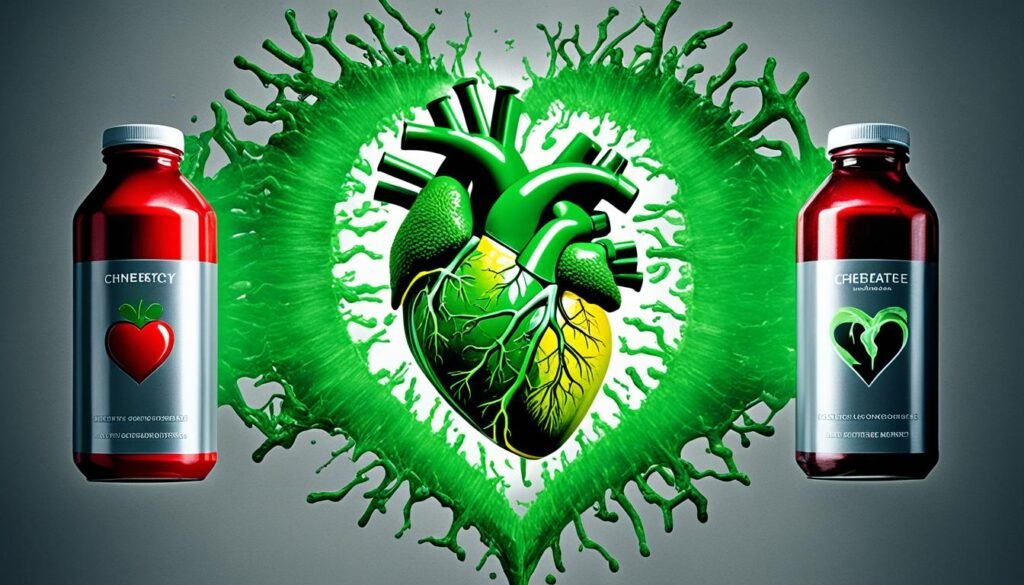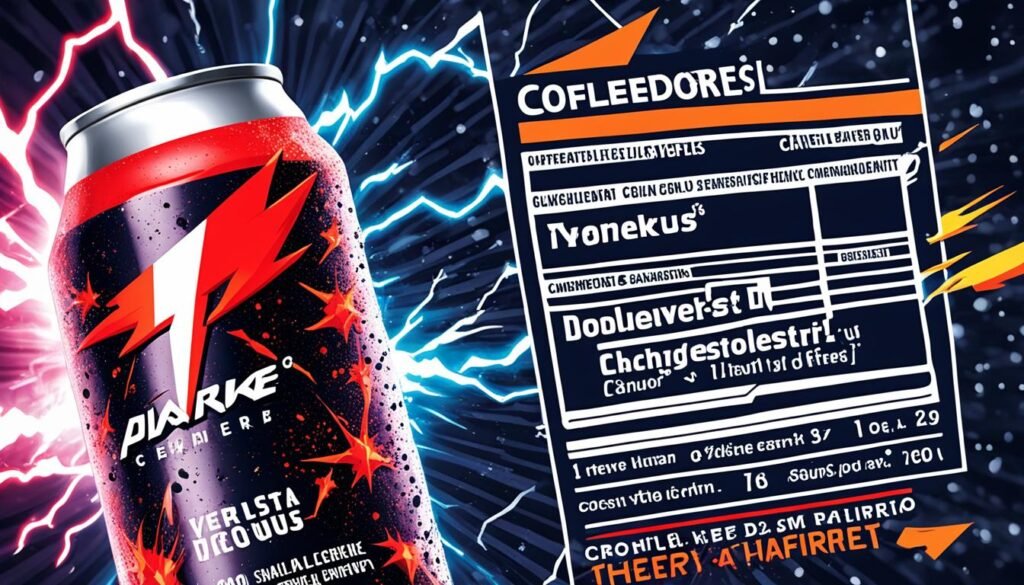Recent research has raised concerns about the potential impact of energy drinks and cholesterol levels. It is becoming increasingly important to understand the effects of these popular beverages on our health. In this article, we will explore the relationship between energy drinks and cholesterol, shedding light on the risks and potential consequences.
Elevated cholesterol levels are a known risk factor for cardiovascular disease. Considering the widespread consumption of energy drinks, it is crucial to examine their impact on our cholesterol levels to make informed decisions about our health and well-being.
High sugar content and caffeine are key components of most energy drinks. These ingredients can influence cholesterol levels in various ways. The excessive sugar content in energy drinks may contribute to weight gain, insulin resistance, and dyslipidemia, all of which can increase the risk of developing high cholesterol. Additionally, the caffeine content in these beverages can impact lipid metabolism and raise LDL cholesterol levels.
While more research is needed to fully understand the mechanisms at play, it is clear that energy drinks have the potential to affect cholesterol levels and contribute to the development of high cholesterol. Understanding these risks can empower individuals to make healthier choices and prioritize their cardiovascular health.
Key Takeaways:
- Recent research has raised concerns about the potential impact of energy drinks on cholesterol levels.
- Elevated cholesterol levels are a known risk factor for cardiovascular disease.
- The high sugar content in energy drinks can contribute to weight gain, insulin resistance, and dyslipidemia, all of which are risk factors for high cholesterol.
- The caffeine content in energy drinks may impact lipid metabolism and raise LDL cholesterol levels.
- Understanding the risks associated with energy drinks can empower individuals to make healthier choices and prioritize their cardiovascular health.
The Relationship Between Energy Drinks and High Cholesterol
Energy drinks have been found to have a connection with high cholesterol levels. The high sugar content in these beverages can lead to weight gain, insulin resistance, and dyslipidemia, all of which are risk factors for high cholesterol. In addition, the caffeine content in energy drinks may impact lipid metabolism and raise LDL cholesterol levels. More research is needed to fully understand the mechanisms at play, but it is clear that energy drinks have the potential to influence cholesterol levels and contribute to the development of high cholesterol.
Consuming energy drinks, which are often marketed as a quick boost of energy, can have unintended consequences for cholesterol levels. The combination of high sugar and caffeine in these beverages can disrupt the body’s normal cholesterol regulation processes, leading to an increase in cholesterol levels.
Recent studies have shown that excessive consumption of energy drinks can lead to weight gain and insulin resistance, both of which are associated with a higher risk of developing high cholesterol. One study conducted on young adults found that those who consumed energy drinks had significantly higher total cholesterol, LDL cholesterol, and triglyceride levels compared to those who did not consume these beverages.
High cholesterol is a well-known risk factor for cardiovascular disease, which includes conditions such as heart attacks and strokes. It is important to be aware of the potential risks associated with energy drink consumption and take steps to maintain healthy cholesterol levels.
While the precise mechanisms responsible for the relationship between energy drinks and high cholesterol are not yet fully understood, the existing evidence points to the need for caution when consuming these beverages. It is crucial to prioritize a balanced diet, regular physical activity, and other healthy lifestyle choices to manage cholesterol levels and reduce the risk of cardiovascular disease.
Effects of Energy Drinks on Cholesterol Levels
There are several ways in which energy drinks can impact cholesterol levels:
- The high sugar content: Energy drinks often contain high levels of added sugars, which can contribute to weight gain and insulin resistance. These factors can lead to dyslipidemia, a condition characterized by abnormal lipid levels in the blood, including elevated cholesterol.
- The caffeine content: Caffeine has been shown to affect lipid metabolism by increasing the production of LDL cholesterol and decreasing HDL cholesterol levels. This can potentially raise overall cholesterol levels and disrupt the balance between “good” and “bad” cholesterol.
- The combination effect: The simultaneous consumption of high levels of sugar and caffeine in energy drinks may exacerbate the negative effects on cholesterol levels. The combination of these ingredients can interfere with the body’s ability to regulate cholesterol effectively.
It is important to note that individual responses to energy drinks can vary based on factors such as overall diet, lifestyle, and genetic predisposition. However, the available research suggests a potential link between energy drink consumption and high cholesterol levels.
| Impact of Energy Drinks on Cholesterol Levels | Evidence |
|---|---|
| Increased risk of dyslipidemia | Several studies have shown a correlation between energy drink consumption and higher levels of total cholesterol, LDL cholesterol, and triglycerides. |
| Weight gain and insulin resistance | The high sugar content of energy drinks can lead to weight gain and insulin resistance, both of which are risk factors for high cholesterol. |
| Disruption of normal lipid metabolism | Caffeine in energy drinks has been found to affect lipid metabolism, potentially raising LDL cholesterol and reducing HDL cholesterol levels. |
While more research is needed to fully understand the mechanisms and long-term effects, it is clear that energy drinks can contribute to the development of high cholesterol. It is advisable to consume these beverages in moderation and make healthier choices to support optimal cholesterol levels and overall cardiovascular health.
The Impact of Energy Drinks on Overall Health and Longevity
When it comes to overall health and longevity, it is essential to approach energy drinks with caution. Excessive consumption of these beverages can have negative implications for your well-being. Regular and excessive intake of energy drinks can lead to weight gain, metabolic disturbances, and high cholesterol levels.
Studies have shown that the high sugar content in energy drinks can contribute to weight gain and metabolic issues, such as insulin resistance. Additionally, the caffeine content in these beverages may disrupt the body’s natural processes, potentially affecting cholesterol regulation.
While occasional consumption of energy drinks may not have significant effects, long-term and excessive intake can increase the risk of chronic diseases that can shorten lifespan. High cholesterol levels, for example, are a known risk factor for cardiovascular disease, which can significantly impact overall health and longevity.
It is important to prioritize a balanced and nutritious diet, combined with regular exercise, to promote good health and longevity. Energy drinks should be consumed in moderation, if at all, to minimize the potential risks to your overall well-being.
Regular and excessive intake of energy drinks can increase the risk of chronic diseases that can shorten lifespan.
Take control of your health by making informed choices about what you consume. Prioritizing a mindful approach to nutrition and seeking natural sources of energy can greatly contribute to your well-being and longevity.
The Risks of Excessive Energy Drink Consumption:
- Weight gain and metabolic disturbances
- High cholesterol levels
- Increased risk of chronic diseases
- Potential negative impact on cardiovascular health
By understanding the potential risks associated with energy drinks and making conscious decisions about your consumption habits, you can take steps towards improving your long-term health and well-being.

Keep in mind:
- Excessive energy drink consumption can lead to weight gain and metabolic disturbances.
- Chronic consumption of energy drinks can increase the risk of high cholesterol levels.
- Regular intake of energy drinks may contribute to the development of chronic diseases.
- Prioritize a balanced diet and regular exercise for optimal health and longevity.
The Risk of High Cholesterol and Cardiovascular Health
High cholesterol poses a significant risk to cardiovascular health, increasing the likelihood of heart attacks and strokes. For individuals who consume energy drinks, there may be an added concern, as these beverages can contribute to elevated cholesterol levels.
It is essential to understand the connection between energy drinks and high cholesterol to make informed choices about our cardiovascular health. By prioritizing a balanced diet and lifestyle, we can reduce the risks associated with elevated cholesterol levels.
The Link Between Energy Drinks and Cholesterol
Energy drinks, although popular for their ability to provide a quick energy boost, are often laden with sugar and caffeine. These ingredients can have detrimental effects on cholesterol levels and overall cardiovascular health.
“Excessive consumption of energy drinks, with their high sugar and caffeine content, can lead to an increase in cholesterol levels.”
The excessive consumption of energy drinks can contribute to weight gain, insulin resistance, and dyslipidemia, all of which are risk factors for high cholesterol. Furthermore, the caffeine content in energy drinks has been found to impact lipid metabolism and raise LDL cholesterol levels.
“The caffeine content in energy drinks can potentially disrupt the body’s cholesterol regulation processes.”
By recognizing the potential risks of energy drinks on cholesterol levels and cardiovascular health, individuals can make more informed choices about their consumption habits. Implementing lifestyle changes that promote healthy cholesterol levels can significantly reduce the risk of developing cardiovascular diseases.
The Role of Lifestyle Factors in Cholesterol Management
Managing cholesterol levels is not solely dependent on avoiding energy drinks but also on adopting a comprehensive approach to cardiovascular health. Lifestyle factors such as maintaining a healthy weight, engaging in regular exercise, and following a balanced diet play a crucial role in cholesterol management.
By incorporating these lifestyle changes, individuals can effectively mitigate the risks associated with high cholesterol levels. It is essential to prioritize cardiovascular health, which involves making informed choices about the consumption of energy drinks and adopting a holistic approach to maintaining healthy cholesterol levels.

| Energy Drinks and Cholesterol | Impact on Cardiovascular Health |
|---|---|
| High sugar content in energy drinks can contribute to elevated cholesterol levels | Excessive consumption of energy drinks increases the risk of cardiovascular diseases |
| Caffeine in energy drinks can disrupt cholesterol regulation processes | Energy drinks can lead to weight gain, insulin resistance, and dyslipidemia |
| Regular intake of energy drinks may raise LDL cholesterol levels | Lifestyle factors such as a balanced diet and exercise are crucial for managing cholesterol |
Table: The relationship between energy drinks, cholesterol levels, and cardiovascular health.
The Role of Sugar in Energy Drinks and Its Impact on Cholesterol
The high sugar content in energy drinks can significantly impact cholesterol levels and overall health. Excessive sugar consumption can lead to weight gain, metabolic disturbances, and dyslipidemia, all of which contribute to elevated cholesterol levels.
Regular consumption of energy drinks, which are often loaded with added sugars, can have particularly negative effects on cholesterol levels. The excessive intake of sugar from these beverages can raise the risk of developing high cholesterol, and subsequently, increase the likelihood of cardiovascular disease, a condition associated with high cholesterol levels.
When consumed in excess, sugar increases the production of triglycerides in the liver. These triglycerides are then transported through the bloodstream, increasing LDL cholesterol (commonly known as “bad” cholesterol) and decreasing HDL cholesterol (known as “good” cholesterol) levels. This imbalance in cholesterol levels can contribute to the development of atherosclerosis, a condition characterized by the accumulation of plaque in the arteries, which can lead to heart attacks and strokes.
It is important to note that energy drinks are not the sole contributors to high cholesterol levels. A diet high in added sugars from other sources, such as sugary snacks and beverages, can also have negative effects on cholesterol. However, due to their high sugar content and popularity among certain demographics, energy drinks have become a growing concern in relation to cholesterol management and cardiovascular health.
To maintain healthy cholesterol levels and reduce the risk of high cholesterol, it is recommended to limit the consumption of energy drinks and other sugary beverages. Instead, opt for healthier alternatives such as water, herbal teas, or naturally flavored beverages. Additionally, adopting a balanced diet that focuses on whole foods, including fruits, vegetables, lean proteins, and whole grains, can positively impact cholesterol levels and overall health.

The Impact of Excessive Sugar Consumption
Excessive sugar consumption, particularly from energy drinks, can lead to various health issues beyond cholesterol concerns. Some potential effects of sugar on the body include:
- Weight gain: The high sugar content in energy drinks can contribute to weight gain, as excess sugar is converted into fat and stored in the body.
- Increased risk of chronic diseases: Regularly consuming high amounts of sugar has been linked to an increased risk of developing chronic conditions such as type 2 diabetes, heart disease, and certain cancers.
- Tooth decay: Sugary drinks, including energy drinks, can contribute to tooth decay and cavities.
- Energy crashes: While energy drinks are often consumed for a temporary energy boost, the high sugar content can lead to energy crashes and fatigue.
It is essential to be mindful of sugar intake, both from energy drinks and other sources, to prioritize overall health and well-being.
Caffeine Content in Energy Drinks and Its Effects on Cholesterol
The caffeine content in energy drinks has garnered attention due to its potential impact on cholesterol regulation. Research studies have indicated that high caffeine intake can influence lipid metabolism and potentially elevate LDL cholesterol levels. While the exact mechanisms behind this correlation are not yet fully understood, it is crucial to be mindful of the caffeine content in energy drinks and its potential effects on cholesterol levels.
Caffeine, a natural stimulant found in various foods and beverages, including energy drinks, has been associated with altered lipid profiles. Some studies suggest that caffeine can increase the levels of LDL (low-density lipoprotein) cholesterol, known as “bad” cholesterol, which is linked to an increased risk of cardiovascular diseases.
Also Read:- Energy Drinks And Digestion: Gut Health Impact
It is important to note that not all energy drinks contain the same amount of caffeine. The caffeine content may vary depending on the brand and the size of the drink. Some energy drinks have significantly higher levels of caffeine than others. For example, a large-sized energy drink can contain more caffeine than a typical cup of coffee.
“The relationship between caffeine and cholesterol is complex and multifaceted. While some studies have shown an association between high caffeine intake and elevated LDL cholesterol levels, other studies have not found a significant correlation. Further research is needed to establish a clearer understanding of how caffeine affects cholesterol regulation.”
Avoiding excessive caffeine intake from energy drinks is advisable, as it can have potential detrimental effects on cholesterol levels. Moderation is key when consuming energy drinks, especially for individuals with pre-existing cholesterol concerns or those at a higher risk of developing cardiovascular diseases.
The Importance of Reading Labels
To make informed choices, it is essential to read the labels of energy drinks and be aware of the caffeine content. Additionally, consider opting for energy drinks with lower sugar content to minimize potential negative effects on cholesterol levels.
Alternatives to Energy Drinks
If you are looking for an energy boost without the potential risks associated with energy drinks, there are alternative options available. Consider incorporating moderate amounts of natural sources of caffeine, such as coffee or tea, into your routine. However, it is important to note that moderation is still key to maintain a healthy lifestyle.

The image above visually represents the connection between caffeine and energy drinks, which are important factors to consider when it comes to cholesterol regulation.
Additional Ingredients in Energy Drinks and Their Effects on Cholesterol
Evidence suggests that energy drinks often contain additional ingredients, such as taurine and guarana, which may have effects on cholesterol levels. While the exact mechanisms of these ingredients and their impact on cholesterol are still being studied, it is important to be aware of their potential effects when consuming energy drinks.
Taurine, an amino acid that is commonly found in energy drinks, is believed to have cardioprotective properties and may help lower cholesterol levels. However, more research is needed to fully understand how taurine influences cholesterol metabolism.
Guarana, a plant extract that is naturally high in caffeine, is often included in energy drinks for its stimulant properties. While caffeine can potentially raise LDL cholesterol levels, the impact of guarana on cholesterol specifically is not well-documented.
It’s important to note that the effects of these additional ingredients may vary depending on the individual and the amount consumed. Moderation and awareness of the ingredients in energy drinks can help individuals make informed choices regarding their consumption to maintain healthy cholesterol levels.
Impact of Additional Energy Drink Ingredients on Cholesterol Levels
| Ingredient | Effect on Cholesterol Levels |
|---|---|
| Taurine | May help lower cholesterol levels, but more research is needed |
| Guarana | Impact on cholesterol levels is not well-documented |
While these ingredients in energy drinks may have potential effects on cholesterol levels, it’s important to remember that diet and lifestyle factors play a significant role in cholesterol management. Maintaining a balanced diet, engaging in regular exercise, and following healthy lifestyle habits are crucial for achieving and maintaining optimal cholesterol levels.
Moderation is Key for Energy Drink Consumption
When it comes to energy drink consumption, moderation is crucial for maintaining healthy cholesterol levels. While the occasional indulgence may not have a significant impact on cholesterol, excessive and regular intake can increase the risks associated with high cholesterol levels. Prioritizing a balanced diet and considering healthier alternatives to boost energy levels can help mitigate these risks.
It’s essential to understand that energy drinks are not a nutritional replacement for a well-rounded diet. While they may provide a temporary energy boost, relying on them excessively can lead to a host of health issues, including high cholesterol. To maintain optimal cholesterol levels, it is recommended to limit energy drink consumption and opt for healthier alternatives that provide sustained energy without compromising cardiovascular health.
By practicing moderation, individuals can better manage their energy drink consumption and minimize the potential negative effects on cholesterol levels. Enjoying an energy drink on occasion as a treat or as part of a balanced lifestyle is generally considered safe, but it’s vital to be mindful of frequency and quantity.
Exploring alternative options to meet energy needs can be beneficial. Incorporating wholesome foods such as whole grains, fruits, vegetables, and lean proteins can provide sustained energy throughout the day without the potential risks associated with energy drink consumption. Additionally, staying hydrated and getting enough sleep can help naturally boost energy levels and reduce the reliance on energy drinks.
“While energy drinks may offer a quick energy fix, moderation is key to avoid potential health risks, including high cholesterol levels. Prioritizing a balanced diet and exploring wholesome alternatives can help one maintain optimal energy levels without compromising cardiovascular health.”
It is important to note that every individual’s tolerance and reaction to energy drinks may vary. Factors such as age, pre-existing health conditions, and overall lifestyle should be considered when determining appropriate energy drink consumption. Consulting with a healthcare professional can provide personalized guidance and help establish a suitable consumption plan that balances energy needs and cholesterol management.
Remember, maintaining healthy cholesterol levels is essential for overall cardiovascular health and well-being. By practicing moderation, understanding the potential risks associated with energy drink consumption, and adopting a balanced lifestyle, individuals can minimize the impact on cholesterol levels and promote long-term health.

| Energy Drink Alternatives | Benefits |
|---|---|
| Water | Provides hydration and supports overall health |
| Green tea | Contains antioxidants and provides a mild energy boost |
| Herbal tea | Offers a variety of flavors and can provide a calming effect |
| Fruit-infused water | Adds a refreshing flavor while providing hydration |
| Homemade smoothies | Packed with nutrients and customizable based on preferences |
The Importance of Lifestyle Factors for Cholesterol Management
Lifestyle factors play a crucial role in managing cholesterol levels and promoting overall well-being. To effectively manage cholesterol, it is essential to incorporate healthy habits into your daily routine. Here are some key lifestyle factors to consider:
- Maintain a Healthy Weight: Maintaining a healthy weight is important for managing cholesterol levels. Excess weight can contribute to high cholesterol and increase the risk of cardiovascular disease. Adopting a balanced diet and engaging in regular exercise can help achieve and maintain a healthy weight.
- Engage in Regular Exercise: Physical activity has numerous benefits for cholesterol management. Regular exercise can increase levels of high-density lipoprotein (HDL) cholesterol, also known as “good” cholesterol, while reducing levels of low-density lipoprotein (LDL) cholesterol, or “bad” cholesterol. Aim for at least 150 minutes of moderate-intensity aerobic activity per week.
- Follow a Balanced Diet: A balanced diet rich in whole grains, fruits, vegetables, lean proteins, and healthy fats can help manage cholesterol levels. Incorporate foods that are high in fiber, such as oats, legumes, and cruciferous vegetables, as they can help lower LDL cholesterol. Limit the consumption of saturated and trans fats, as they can raise cholesterol levels.
- Avoid Smoking and Limit Alcohol Intake: Smoking damages blood vessels and lowers levels of HDL cholesterol. Quitting smoking can have a significant positive impact on cholesterol levels and overall cardiovascular health. Additionally, excess alcohol consumption can contribute to high cholesterol. Limit alcohol intake to moderate levels, which equates to up to one drink per day for women and two drinks per day for men.
By incorporating these lifestyle factors into your daily routine, you can effectively manage cholesterol levels and reduce the risk of cardiovascular disease. It is important to prioritize cardiovascular health and overall well-being through these healthy lifestyle changes.
“The choices you make today determine your health and well-being tomorrow.”
Conclusion
In conclusion, the consumption of energy drinks can have a significant impact on cholesterol levels. The high amounts of sugar and caffeine found in these beverages contribute to an increased risk of developing high cholesterol, which is a known risk factor for cardiovascular disease. To maintain healthy cholesterol levels and overall well-being, it is crucial to approach energy drinks with caution and prioritize a balanced diet and lifestyle.
Moderation is key when it comes to consuming energy drinks. While occasional consumption may not have severe consequences, excessive and regular intake can pose serious risks to cholesterol levels and cardiovascular health. Being aware of the potential dangers associated with energy drink consumption is essential for making informed decisions about one’s dietary choices.
As part of a comprehensive approach to cholesterol management and overall health, individuals should consider adopting healthier alternatives to energy drinks. Prioritizing a balanced diet, regular exercise, and maintaining a healthy weight are essential factors for managing cholesterol levels effectively. By making these lifestyle changes and minimizing the consumption of energy drinks, individuals can optimize their cholesterol levels and promote better cardiovascular health.
FAQs
Q: Can energy drinks cause high cholesterol levels?
A: Some studies have suggested that the consumption of energy drinks, especially those high in sugar and caffeine, may lead to an increase in serum cholesterol and triglyceride levels, which are associated with high cholesterol.
Q: What is the link between energy drinks and LDL and HDL cholesterol?
A: Regular consumption of energy drinks, particularly those with high sugar content, may contribute to higher LDL (“bad”) cholesterol levels and lower HDL (“good”) cholesterol levels, which can be detrimental to heart health.
Q: Are sugary drinks like Red Bull a risk factor for high cholesterol levels?
A: Yes, sugary drinks such as Red Bull can be considered a risk factor for high cholesterol levels, as the excessive intake of sugar can lead to adverse effects on serum cholesterol and triglycerides, ultimately impacting your cholesterol levels.
Q: Can chronic consumption of energy drinks lead to adverse effects on cholesterol levels?
A: Yes, chronic consumption of energy drinks can lead to adverse effects on cholesterol levels, as the combination of high sugar and caffeine content in these drinks may impact serum cholesterol and triglyceride concentrations over time.
Q: How do energy drinks affect the body’s cholesterol levels?
A: Regular consumption of energy drinks, particularly those containing high levels of sugar and caffeine, can potentially impact the body’s cholesterol levels by contributing to an increase in serum cholesterol and triglycerides, which are key indicators of high cholesterol levels.
Q: What does the body need to maintain healthy cholesterol levels when consuming energy drinks?
A: When consuming energy drinks, it’s important for the body to maintain a balanced and healthy diet, limit the intake of sugary and caffeinated beverages, and engage in regular physical activity to help mitigate any potential negative effects on cholesterol levels.
Q: What are the potential health concerns associated with the consumption of Red Bull and similar caffeinated drinks in relation to cholesterol levels?
A: The consumption of Red Bull and similar caffeinated drinks has been associated with potential adverse effects on cholesterol concentrations, which could increase the risk of heart disease and negatively impact overall heart health.





